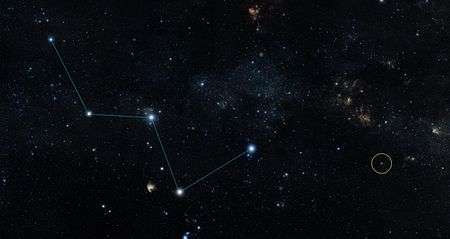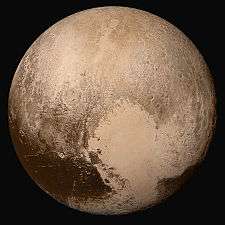HD 219134 g
| Exoplanet | List of exoplanets | |
|---|---|---|
| Parent star | ||
| Star | HR 8832 | |
| Constellation | Cassiopeia | |
| Right ascension | (α) | 23h 13m 16.97632s |
| Declination | (δ) | +57° 10′ 06.0823″ |
| Apparent magnitude | (mV) | 5.574 |
| Distance | 21.25 ly (6.52 pc) | |
| Spectral type | K3 V | |
| Temperature | (T) | 4710 K |
| Observed separation | ||
| Orbital elements | ||
| Semi-major axis | (a) | 0.3753 (± 0.0004)[1] AU |
| Eccentricity | (e) | 0[1] |
| Orbital period | (P) | 94.2 (± 0.2)[1] d |
| Inclination | (i) | null[1]° |
| Physical characteristics | ||
| Mass | (m) | 10.81±1.27[1] M⊕ |
| Discovery information | ||
| Discovery date | 2015 November 17 | |
| Discoverer(s) | ||
| Discovery method | radial velocity method | |
| Discovery status | Published | |
HD 219134 g also known as HR 8832 g is an exoplanet orbiting around the K-type star HR 8832 in the constellation of Cassiopeia. It has a mass of 11 Earth Masses. Unlike HD 219134 b it has not been observed by the Spitzer telescope and thus its radius and density are unknown. It may be in the habitable zone. If it has an Earth-like composition, it would have a radius 1.9 times that of Earth.

References
| ||||||||||
| |||||||||||||||||||||||||||||||||||||
This article is issued from Wikipedia - version of the Saturday, January 23, 2016. The text is available under the Creative Commons Attribution/Share Alike but additional terms may apply for the media files.


